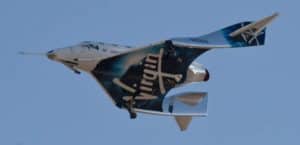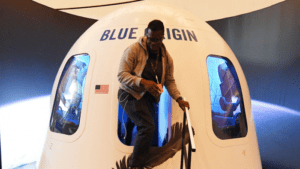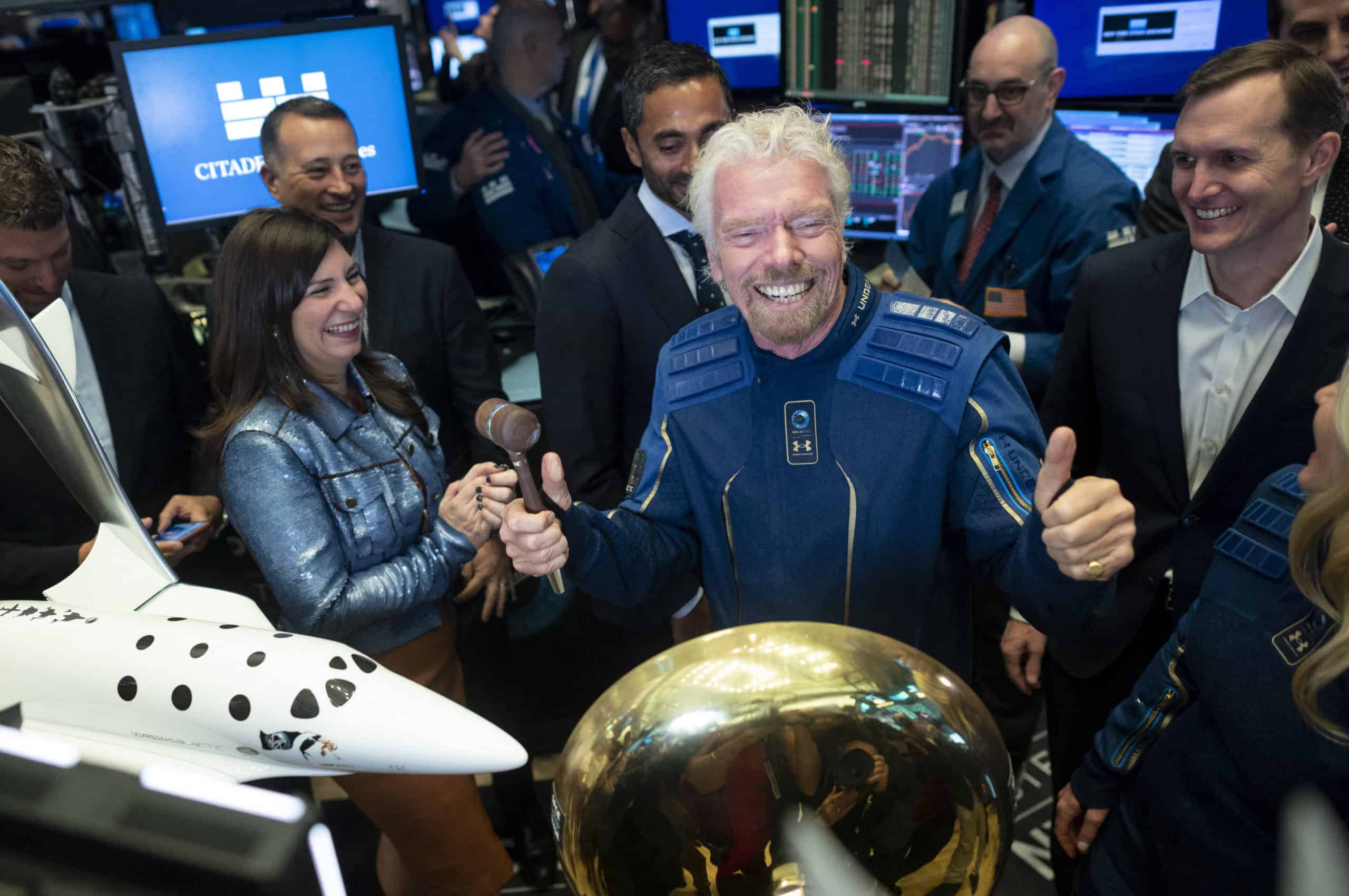-
Virgin Galactic boss is hoping to finally get the nascent space tourism industry off the ground
-
Branson’s official role is to evaluate the private astronaut experience to enhance the journey for future clients
He’s always dreamed of it, and in 2004 founded his own company to make it happen.
On Sunday, billionaire Richard Branson will take off from a base in New Mexico aboard a Virgin Galactic vessel bound for the edge of space.
The Briton is hoping to finally get the nascent space tourism industry off the ground — but also go one up on Jeff Bezos by winning the race to be the first person to cross the final frontier in a ship built by their own company.
The Amazon founder’s great rival, SpaceX boss Elon Musk, announced on Twitter he’d be there to witness it.
“Will see you there to wish you the best,” he wrote to Branson.
Hours later, Bezos chimed in with a message of support, but only after his own company, Blue Origin, had posted a viral tweet drawing an unfavorable comparison between its space offerings and Virgin Galactic’s.
Several tourists journeyed to the International Space Station in the 2000s, but on board Russian rockets.
My mission statement is to turn the dream of space travel into a reality – for my grandchildren, for your grandchildren, for everyone.
Watch the launch of the next space age at 6 am PT | 9 am ET | 2 pm BST on https://t.co/1313b4RAKI @virgingalactic #Unity22 pic.twitter.com/JpqXx8cy04
— Richard Branson (@richardbranson) July 11, 2021
Branson’s official role is to evaluate the private astronaut experience to enhance the journey for future clients.
The spaceflight should take place shortly after 7:00 am Mountain Time (1300 GMT), with a livestream provided by Virgin Galactic on its website.
A massive carrier plane will take off from a horizontal runway, flown by two pilots, gaining altitude for about an hour.
Below this plane hangs the spaceship VSS Unity — a SpaceShipTwo-class suborbital rocket-powered spaceplane — with two more pilots and four passengers: Branson and three Virgin employees.
After climbing to 50,000 feet (15 kilometers), VSS Unity, which is about the size of a private jet, will be dropped and then ignites its rocket-powered engine to ascend at Mach 3 beyond the 50 miles (80 kilometers) of altitude considered the edge of space by US agencies.
Once the rocket engine is cut off, passengers can unbuckle and experience a few minutes of weightlessness, while admiring the curvature of Earth from the ship’s 17 windows.
After peaking at around 55 miles of altitude, the ship re-enters the thick part of the atmosphere and glides back to the runway.
Space base
Branson, who founded the Virgin Group — which today has interests in everything from commercial aviation to fitness centers — is known for his appetite for adventure and has set world records in hot air ballooning and boating.
“As a child, I wanted to go to space,” the brash 70-year-old wrote a few days ahead of his trip. “When that did not look likely for my generation, I registered the name Virgin Galactic with the notion of creating a company that could make it happen.”
A dream that almost came to an end in 2014 when an in-flight accident of a Virgin Galactic vessel caused the death of a pilot, considerably delaying the program.
Since then, VSS Unity has successfully reached space three times, in 2018, 2019 — which included the first crew member who wasn’t a pilot, and finally May this year.
Sunday’s spaceflight takes off from Spaceport America, a huge base built in the Jornada del Muerto desert, around 20 miles southeast of the nearest dwelling, Truth or Consequences.
Financed largely by the state of New Mexico, Virgin Galactic is the principal tenant.
The base includes a runway more than two miles long and a building with spaces dedicated to flight operations, as well as a reception center for future customers.
Paying passengers in 2022?
After Sunday, Virgin Galactic plans two further flights, then the start of regular commercial operations from early 2022. The ultimate goal is to conduct 400 flights per year.
Some 600 tickets have already been sold to people from 60 different countries — including Hollywood celebrities — for prices ranging from $200,000 to $250,000.
And though, according to Branson, “space belongs to us all,” the opportunity for now remains the preserve of the privileged.
“When we return, I will announce something very exciting to give more people the chance to become an astronaut,” he promised.
The competition in the space tourism sector, whose imminent rise has been announced for years, has come to a head this month.
Bezos, the richest man in the world, is due to fly on July 20 on Blue Origin’s New Shepard rocket.
Blue Origin posted an infographic Friday boasting the ways in which the experience it offers is superior.
The principal point: New Shepard climbs up to more than 60 miles in altitude, thus exceeding what is called the Karman line, the frontier of space according to the international convention.
“None of our astronauts have an asterisk next to their name,” the company bragged.
Agence France-Presse
Virgin Galactic, Blue Origin face off in space tourism market
The era of space tourism is set to soar, with highly symbolic flights by rivals Virgin Galactic and Blue Origin scheduled just days apart.

The two companies will serve the nascent market for suborbital flights lasting just a few minutes, long enough for passengers to experience weightlessness and view the contour of the planet.
But that’s where their similarity ends.
Branson, who heads the Virgin Group conglomerate that includes everything from entertainment to financial services to telecoms, founded Virgin Galactic in 2004. The 70-year-old’s previous daredevil exploits include crossing the Pacific in a hot-air balloon and navigating the English Channel in an amphibious vehicle.
Bezos is 57 years old and the world’s richest man. A science fiction fan, he founded Blue Origin in 2000 and recently stepped down as Amazon CEO to focus on space projects and other endeavors.
Different spacecraft
The spacecraft developed by the two companies could not be more different.
Virgin Galactic’s spacecraft is not a classic rocket. It’s attached to the belly of a large carrier airplane that takes off from a runway.
After an hour it reaches an altitude high enough to release the smaller spacecraft, the VSS Unity, that in turn fires its engines and reaches suborbital space — where passengers float weightlessly for a few minutes — then glides back to earth.
The spacecraft can accommodate two pilots and up to six passengers. The cabin has 12 large windows and 16 cameras.

Once it reaches the proper altitude, a capsule separates from the booster and then spends four minutes at an altitude exceeding 60 miles (100 kilometers), during which time those on board experience weightlessness and can observe the curvature of Earth.
The booster lands autonomously on a pad two miles from the launch site, and the capsule floats back to the surface with three large parachutes that slow it down to about a mile per hour when it lands.
The capsule has six seats and six large windows.
Commercial ambitions
Virgin Galactic plans to start regular commercial operations in early 2022, and is aiming to carry out 400 flights per year from Spaceport America, its base in New Mexico.
Some 600 tickets have already been sold, including to Hollywood celebrities, for prices ranging between $200,000 and $250,000. Tickets are expected to be even more expensive when they go on sale to the public.
Blue Origin has yet to announce ticket prices or a date for the start of commercial operations. But a seat for the July 20 flight was sold an auction — and the mysterious winner paid $28 million.
Agence France-Presse








